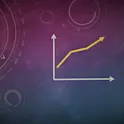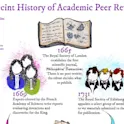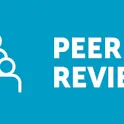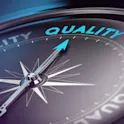
Life sciences
03 Jan 2017
Citations cartels: an emerging problem in scientific publishing
Groups of authors citing each other is becoming an issue in scientific publishing. With a new approach, researchers discuss how to identify the problem

Life sciences
03 Jan 2017
Groups of authors citing each other is becoming an issue in scientific publishing. With a new approach, researchers discuss how to identify the problem

Open science and peer review
25 Nov 2016
A recent study analyzes the investment in OA publishing by German research institutions, indicating a growing trend toward full open access and raising important questions about hybrid OA journals.

Frontiers news
20 Sep 2016
Frontiers’ founding principle is to empower researchers in the publishing process. We distribute editorial responsibility to our Editorial Boards, to which we appoint leading experts according to strict criteria of excellence.

Open science and peer review
15 Sep 2016
Although peer review is now a fundamental quality control measure implemented during the publishing process, the practice as we know it today is quite different from how it was envisioned almost two centuries ago. PDF version available here: A Succinct History of Academic Peer Review References Csiszar, A. (2016) Peer review: Troubled from the start. Nature 532:306-8 doi:10.1038/532306a Spier, R. (2002) The history of the peer-review process. Trends in Biotechnology 20(8):357-8 doi: 10.1016/S0167-7799(02)01985-6

Open science and peer review
14 Sep 2016
Peer review plays a pivotal role in the advancement of scholarly literature. Around 2 million research papers are currently published every year, all assessed by expert colleagues to analyse the authors’ results and conclusions, provide detailed feedback and help shape the manuscripts. But it is a largely thankless task. In most cases, the hours spent conducting a peer review at the service of the community go unrecognized. The First Step in Peer Review Recognition Frontiers believes in recognizing and rewarding peer review contributions, which we’ve pioneered since 2007. We consider transparency and accountability key to achieving high quality research. For this reason, we list the names of reviewers and handling editors on published articles as a certification of accuracy and validity. Featuring the reviewers’ names alongside the authors not only provides credibility to the quality of the peer review, but is a way of recognizing their dedication and contribution to improving the paper and ensuring its accuracy. Beyond the Paper: Why Volunteer to Peer Review There are many reasons why researchers participate and volunteer to peer review papers. These range from ensuring the rigorous standards of the research published in the field are met, to fulfilling a sense of responsibility to the community […]

Open science and peer review
21 Aug 2016
Frontiers has several key strategies to ensure the highest quality standards possible through our collaborative peer review.

Open science policy
31 May 2016
By Emily Barker, Communications Strategist at Frontiers There was a breakthrough for open-access publishing on Friday 27 May, as EU research ministers published a commitment to make open access to scientific publications as the default option by 2020. “It’s a major step forward,” said EU Research Commissioner Carlos Moedas. “You cannot stop the movement. Publishers will have to change their business models.” What does this mean for science publishing? The open-access movement isn’t new. Already over 30% of peer-reviewed papers are now published in some form of Open Access, which means the tipping point for disruption has already come and gone. Frontiers, born digital in 2007, was the first open-access publisher to develop its own publishing platform that has not only revolutionized the peer-review process by making it more transparent, but has also helped advance research by publishing sound science rapidly while making it openly accessible to all. Unlike traditional publishing, the costs for open-access publishers are far lower as they have no costs for paper or printing distribution. However, that does not mean they are free. Open-access journals need editors and editorial support staff to maintain quality and a complex, scalable technological backbone for storage and to ensure the research they publish is always […]

Open science and peer review
06 Apr 2016
by Sandra Hausmann, Frontiers Business Development Manager On March 31st we brought five high profile Frontiers editors together for a panel discussion at the ICIS hosted event in UC Davis: “ Frontiers in Publishing – Experiences with Open Access Journals”. Mary Christopher, Field Chief Editor for Frontiers in Veterinary Science , Neelima Sinha, Specialty Chief Editor for Plant Evolution and Development, Cecilia Giulivi, Specialty Chief Editor for Cellular Biochemistry, Patrice Koehl, Specialty Chief Editor for Mathematics of Biomolecules, and Arne Ekstrom, Guest Associate Editor Frontiers in Human Neuroscience joined us for a lively discussion on open access and their experience as editors of Frontiers. The event was moderated by MacKenzie Smith, head of the library at UC Davis, who challenged the panelists on how their experience as Frontiers editors influenced the way they viewed open access and how well open access was received within their disciplines. The discussion also touched on article processing fees, quality, and volume of open access publications. In general, open access was well received. Cecilia mentioned the fact that with OA authors can actually re-use their published work e.g. for teaching without infringing the publishers copy right, was a major improvement. Mary even pointed out that […]

Open science and peer review
27 Jan 2016
Surveys among thousands of our authors, editors, reviewers show high overall satisfaction with Frontiers, but also yield constructive criticisms which help us to improve our processes and platform. Frontiers is determined to let researchers shape scholarly publishing. It is therefore important that we listen to you, the researchers. Send us your suggestions, your criticisms, your requests – we welcome them. We don’t claim to be perfect, but we are constantly evolving, based on feedback from the scientific community. It is particularly easy for Frontiers to make improvements, because we are the first and only publisher to have built our IT platform in-house and from scratch, ensuring maximum flexibility of our system and processes. Every day, Frontiers actively looks for such feedback, for example through conference calls and meetings with our editorial boards, through discussions with researchers at conferences around the world, and by tracking comments on social media. Another way is through continuous user satisfaction surveys. Here, we give a summary of results from two such surveys, with a combined response of over 11,000 Frontiers authors, editors, and reviewers. These surveys point to considerable satisfaction with Frontiers, but also yield constructive criticisms which allow us to improve further. The surveys in brief […]

Open science and peer review
20 Oct 2015
Selected news, views and information on Open Science and scholarly publishing from the past week

Open science and peer review
13 Oct 2015
Selected news, views and information on Open Science and scholarly publishing from the past week

Open science and peer review
02 Oct 2015
Selected news, views and information on Open Science and scholarly publishing from the past week

Open science and peer review
12 Sep 2015
Selected news, views and information on Open Science and scholarly publishing from the past week

Open science and peer review
07 Sep 2015
Selected news, views and information on Open Science and scholarly publishing from the past week

Open science and peer review
01 Sep 2015
In recent months, several academic publishers have been forced to retract a combined total of over 250 published articles across a number of disciplines due to irregularities and outright fraudulence in the peer-review process. As a result of this, the stringency of checks carried out by publishers during the submission and review process of manuscripts has come under the spotlight. Here, we give some background to this ongoing issue and discuss the various practices by which it can be contained. At the beginning of 2014, several journals under the aegis of a major publishing house were forced to retract 100+ papers when it was revealed that these papers had been “created” by SCIgen, a computer program that generates ‘random Computer Science research’ using context-free grammar. Later that year, a piece in Nature by retractionwatch.com activists Ivan Oransky, Cat Ferguson and Adam Marcus warned of the increasing danger of authors surreptitiously reviewing their own papers; an issue taken up by COPE (Committee on Publication Ethics) in a statement on 19 December 2014. Although ostensibly different issues, they both pointed towards problems residing at the core of academic publication – the soundness of peer-review. In March of this year, a Web of […]
Get the latest research updates, subscribe to our newsletter